Imperial Glory
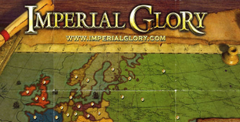
| a game by | Pyro Studios S.L. |
| Platform: | PC (2005) |
| User Rating: | 7.2/10 - 5 votes |
| Rate this game: | |
| See also: | Best RTS Games |
Pyro Studios, responsible for Praetorians and the Commando franchise (see left) is understandably quite excited about its forthcoming strategy project Imperial Glory. Although Spain's premier developer is dismissive of any comparisons between Impenal Glory and The Creative Assembly's magnificent Rome: Total War, it clearly has plans to ambush the RTS superpower before it can gather its troops for an expansion pack. Imperial Glory presents a glorious technicolour Napoleon-era strategy romp with detailed troops going at each other with state-of-the-art (at this time in history) muskets and cannons.
"To be honest," says Pyro's communications manager Inigo Vinos, I don't think Imperial Glory will improve the (Total War) formula - it's a different composition. I think that Rome improves Medieval, and Medieval improves Shogun, but Imperial Glory is on a different line.
The line being referred to is of course a histoneal timeline, for Imperial Glory is set squarely during a period when established European empires were squabbling over new and old world alike. Although the game features a now familiar blend of turn-based campaigning and real-time 3D, the major difference is that rather than sword and arrow, the currency of carnage here is lead shot and shrapnel, fired across both land and sea.
Unlike Rome, Imperial Glory's turn-based campaign will be set across strictly-bordered regions (a la Shogun/Medieval), which may seem a regressive step after sampling Rome's more tactical method of grand warfare. However, it appears Pyro is aiming to provide a faster-paced game, where tactical prowess and technical innovation are more important facets of leadership than managing a civilian population. "Some people like Civilization more than Age Of Empires," says Vinos, presumably meaning Total War can be likened to the former and Imperial Glory the latter.
Whatever the outcome of the forthcoming battle, Pyro is on target to release the game before the spring - and the team is currently tweaking the Al and balancing the units and strategies of the five playable nations. Hopefully, we'll have more play of the preview code in next issue - which should give you just enough time to sit down and conquer Rome a second time...
Download Imperial Glory

System requirements:
- PC compatible
- Operating systems: Windows 10/Windows 8/Windows 7/2000/Vista/WinXP
Game Reviews
Over the course of three games, Total War developer The Creative Assembly has established itself as the most consistent and innovative company in the strategy sphere. Its games have proved to be immediately accessible and deeply engrossing, fusing 2D turn-based and 3D real-time strategy into a vast and cohesive whole, that has earned the UK studio critical and commercial success.
However, despite the awards and the ceaseless acclaim, the appearance of Imperial Glory must surely be the ultimate accolade, for as all developers know, you've only truly made it when everyone else starts borrowing your ideas. While a handful of games have in part been inspired by Total War, Pyro's wholesale lifting of the Total War concept is the first to be, well, total.
Attack Of A Clone
Branding Imperial Glory a clone may be unfair, but it's accurate, for without The Creative Assembly having done all the groundwork, IG would in all likelihood have turned out much like Pyro's previous RTS offering Praetorians. That's not to belittle either game (Praetorians was an underrated cracker, in my opinion), just an undeniable fact. Similarly, just because IG is in all but name a Total War game, it would be a mistake to just dismiss it as being derivative, as Imperial Glory often manages to counter the Total War series with a small feature or addition makes it ev so-slightly distinct.
The first of these is, of course, the Napoleonic era during which the central campaign is set - specifically 1791 -1830, a period when most of Europe seemed to be at war pretty much all of the time. Choosing one of five warring nations (England, Austria, Prussia, France or Russia), the aim is to secure the most victory points before the sands of time run out, whether by military domination, trading and research, peaceful diplomacy, or very probably all of the above. Regardless of the strategy you employ, the campaign is played out across a map of Europe, with you and your Al neighbours taking turns to shuffle armies between territories, set up trade routes and erect the necessary buildings so that you may rake in more resources, increase productivity or recruit the units that will ensure victory.
Of course, military expansion will be the most obvious and certainly the most enjoyable method of progression, but it is entirely possible to win the game without resorting to violence. As England, I managed this by maintaining a formidable Navy to protect lucrative trade routes, whilst France, Austria and Prussia squabbled over Central Europe. As an economic power I was untouchable for most of the campaign, with trading outposts scattered across Europe, and merchant ships busy ferrying goods between ports. England was stinking rich, and I could buy off any nations who started getting shirty. Such a strategy would be unlikely to work had I been on the throne of Russia, for example, but my point is that although the choice of nations is small, each one offers a very different challenge.
Diplomatic Impunity
Whichever route to victory you choose to follow, Pyro has ensured that there is always plenty to do. Given the brief stretch of history during which the game is set there is a sizeable research tree to plough through, that offers over 70 different technologies set across three rather arbitrary phases. It's not a broad selection by any stretch, seeing as you must research every tech in each phase before moving to the next, but it allows you to further specialise whatever strategy you choose to follow and get a brief advantage over competitors.
Research is further expanded with a series of quests that become unlocked as new technologies are mastered. Typically requiring you to amass a certain amount of resources or population units, by completing these quests you are given certain bonuses that can offer a quick advantage over other nations.
But by far the most enjoyable and important aspect of the turn-based campaign is the diplomacy system, which allows you to make and break alliances, declare war, request rights of passage, trade and lend military units to coalition allies. By building embassies and newspaper offices in foreign countries, you can subvert other nations to your way of thinking. If no other nation makes a move you can, in time, peaceably annex the province and make it your own. And should another nation look likely to do the same to a province bordering yours, a build-up of force may well put them off - although you can expect a hit on your standing, one that's especially harsh should you carry out your threat without first declaring war. In short, it's refreshing to enjoy a wargame where diplomacy is given such priority - especially so here, as it's integrated so well within the framework of the game.
Command & Conquer
However skilful you are at bending governments to your manifesto, given the turbulent times during which the game is set, military conflict is inevitable. As with Total War, should two armies meet, the game switches into a real-time view of the province in dispute, with both armies facing off across a 3D landscape. To anyone familiar with the aforementioned TW games, the interface, views and controls will be immediately familiar.
Units are directed across the map as squads, with you able to set formations and drag out a line so that the troops will face in the desired direction when or if they reach their destination. What may come as a shock is the pace of the battles themselves, for whilst essentially IG requires the same paper-scissors-stone mentality as Total War, you will have to deal with weapons with ranges far greater than slings and arrows, and mounted soldiers that, unburdened by armour and heavy lances, will charge swiftly and decisively. The dynamics of combat may be the same - seek high ground, fake the enemy into your line of fire, cover your flanks, kick ass - but the pace of the 3D battle sequences make Rome's seem positively catatonic.
Napoleon Dynamite
Imperial Glory is undoubtedly varied and accessible, but it still comes up short when compared to the mighty Rome. The spread of units is impressive, but the difference between many of them is so slight that it pays not to vary your force beyond three or four unit types. Al is competent, with troops retreating when overwhelmed, yet advancing into certain death perhaps a bit too readily.
Similarly, while soldiers will take cover among trees and inside buildings, the enemy do tend to break cover at the first sign of trouble. No bad thing, but whichever nation you happen to be fighting, they each seem to follow the same tactics - you would expect the French to perhaps be more aggressive, for example. There are other niggles too: such as the fact that defending forces cannot be deployed as they can in Total War, making the centrepiece battles for the capital cities seem less of a siege and more of a land-grab.
However, taking all the criticisms into account, it would take an unforgiving soul to be unimpressed with what Pyro has created for Imperial Glory, which is far and away the most spectacular wargame ever to be set during the Napoleonic era. It might not be up to quite the same standard as Total War in the scale and depth of its 3D battles, but graphically, the game just nudges ahead.
All in all, it's not far from forcing a stalemate. What's more, with two full campaigns to enjoy, a customisable skirmish option that can be taken online, and a small collection of historical encounters (Waterloo, Austerlitz), there's plenty to be getting on with before The Creative Assembly starts making serious plans to drag itself away from ancient history.
All At Sea
What's The Story, Imperial Glory? Only That This Has The Best Sea Battles Ever Created
If there's one area in which Imperial Glory sticks one in the eye of Total War, it's with its enjoyably complex sea battles. Manoeuvrable sloops, frigates and heavily-armed galleons are the three classes of vessel at your disposal, and commanding just one is a far more involving affair than directing light infantry.
Using the wind to keep up a decent rate of knots, timing is essential: get it wrong and watch your balls plop harmlessly in the water - even around enemy vessels directly in your firing arc. Should you wish to board and capture a ship to add to your fleet, the right shot must be used to disable it and eliminate the crew. When firing, you can adjust the firing arc to pepper a wide area, or concentrate your fire in order to quickly eliminate the enemy. What's for sure is that the sea battles are a star feature, and one that The Creative Assembly is sure to adapt and make its own.
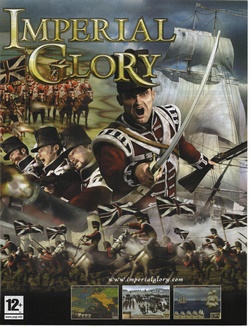
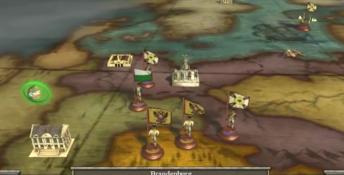
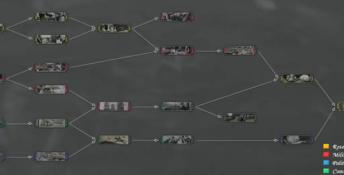
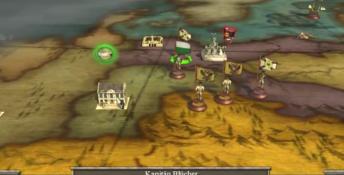
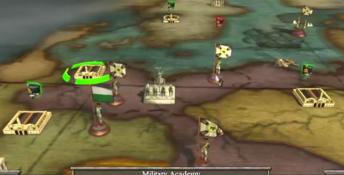
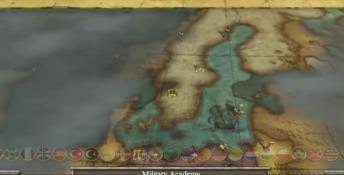
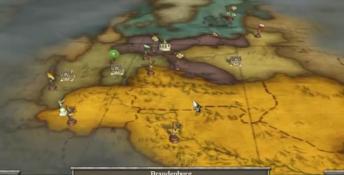
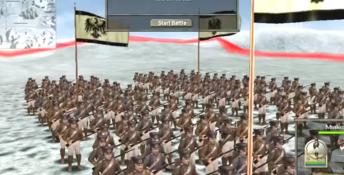
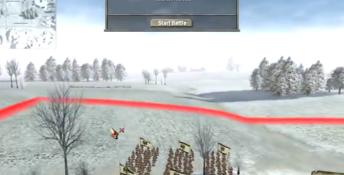
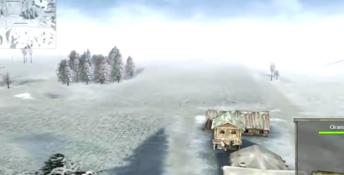
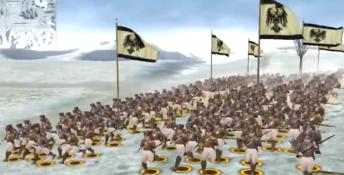
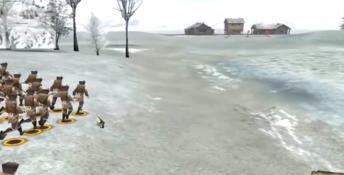
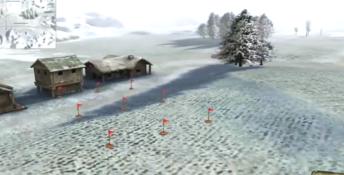
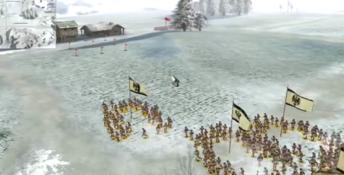
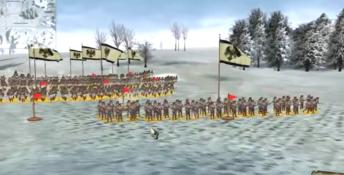
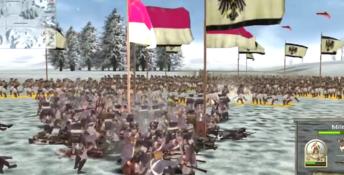
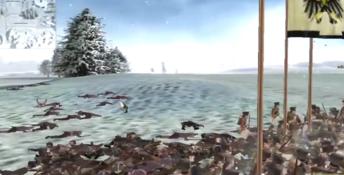
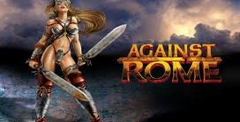 Against Rome
Against Rome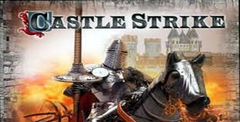 Castle Strike
Castle Strike Darwinia
Darwinia
 Earth 2160
Earth 2160
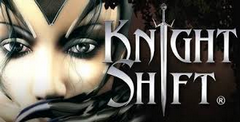 Knightshift
Knightshift
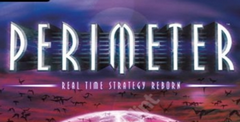 Perimeter
Perimeter
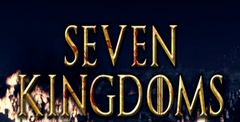 Seven Kingdoms
Seven Kingdoms
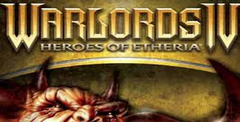 Warlords 4: Heroes of Etheria
Warlords 4: Heroes of Etheria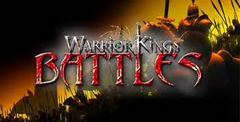 Warrior Kings: Battles
Warrior Kings: Battles
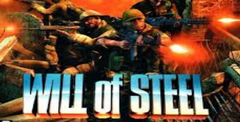 Will Of Steel
Will Of Steel